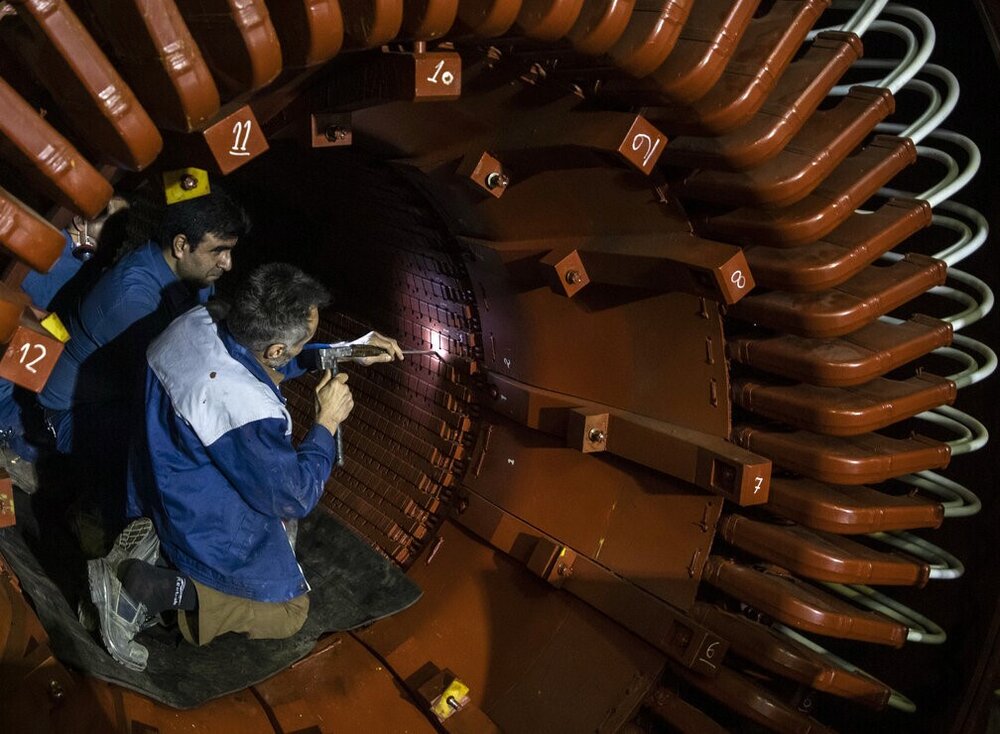Iran moving towards self-sufficiency in power plant equipment manufacturing

TEHRAN – Over the past few years and especially since the re-imposition of the U.S. sanctions, strengthening domestic production and achieving self-reliance has become Iran’s major strategy in all areas.
This new strategy has been pursued in various sectors including oil and gas, petrochemicals, and also the electricity sector which is of vital importance for the development of the country.
In this regard, like the previous year, the Energy Ministry has put the indigenization of major equipment and items used in this industry atop agenda in the current Iranian calendar year (began on March 21), which is named the year of “production: Support and elimination of obstacles”.
So, all the organizations and entities involved in the energy sector have been tasked to define special programs for supporting the domestic production of equipment and machinery.
As a major player in the country’s electricity generation field, Thermal Power Plants Holding Company (TPPH) has been one of the pioneers in this due.
According to the Director-General of TPPH’s Indigenization Office Ali Isa-Pour, currently, about 80 percent of the sophisticated equipment used in the construction and overhaul of the country’s power plants are supplied by domestic producers.
The official noted that last year over 350,000 power plant equipment items were manufactured by domestic companies and supplied to power plants across the country.
“Following the general policies of the government regarding the maximum use of the capacities of domestic companies and empowering them for cutting dependence in the sanctions era, indigenization of the parts and equipment has become a major priority of Thermal Power Plant Holding and its subsidiaries,” Isa-Pour said.
The company is also planning to publish the information regarding the domestically manufactured equipment and parts on a special website so that other power plant companies across the country would be able to order the items they might need.
Complete self-sufficiency in building gas power plants
In addition to the mentioned achievements, in some areas, the country has even become fully self-sufficient and is able to export equipment and machinery to other countries.
According to the former Managing Director of Iranian Electrical Power Equipment Manufacturing and Provision Company (known as SATKAB) Mohammad-Vali Alaedini, the country is fully able to produce and export all equipment and services needed for the construction of gas power plants.
“Our ability for manufacturing and supplying water and electricity equipment has reached a point where we are not only able to fully meet our domestic demand but also export it to other countries,” Alaedini said.
He had mentioned Iraq, Armenia, Syria, and Tajikistan as some of the export destinations for Iranian energy equipment and services, adding "We have achieved 80 percent self-sufficiency in construction of other power plant equipment, while in construction of gas power plants, hydroelectric power plants, and dams we are completely self-sufficient and exporting services to other countries.”
Manufacturing world-class gas turbines
As another major step toward complete self-reliance in the energy industry, Iran’s MAPNA Group, which is the first and leading West Asia-based general contractor of thermal power plants in the MENA region, has recently announced that the Islamic Republic is going to become an exporter of new classes of gas turbines in near future.
Speaking on the sidelines of the signing ceremony of a deal for manufacturing an MGT-75 gas turbine for TPPH in late March, MAPNA Head Abbas Ali-Abadi said: “Iran now has the knowledge and technology to design and manufacture a variety of new gas turbines on a global scale.”
“We will present this turbine [MGT-75] in the global market soon and it will undoubtedly be well received,” Ali-Abadi added.
MAPNA had previously manufactured E-class and F-class turbines such as MGT-70.
Turning the restrictions created by the U.S. sanctions into opportunities, the Islamic Republic which used to import such pieces of equipment from foreign sources such as Germany’s Siemens, is now among the world’s top manufacturers of power plants with high efficiency.
EF/MA
Leave a Comment